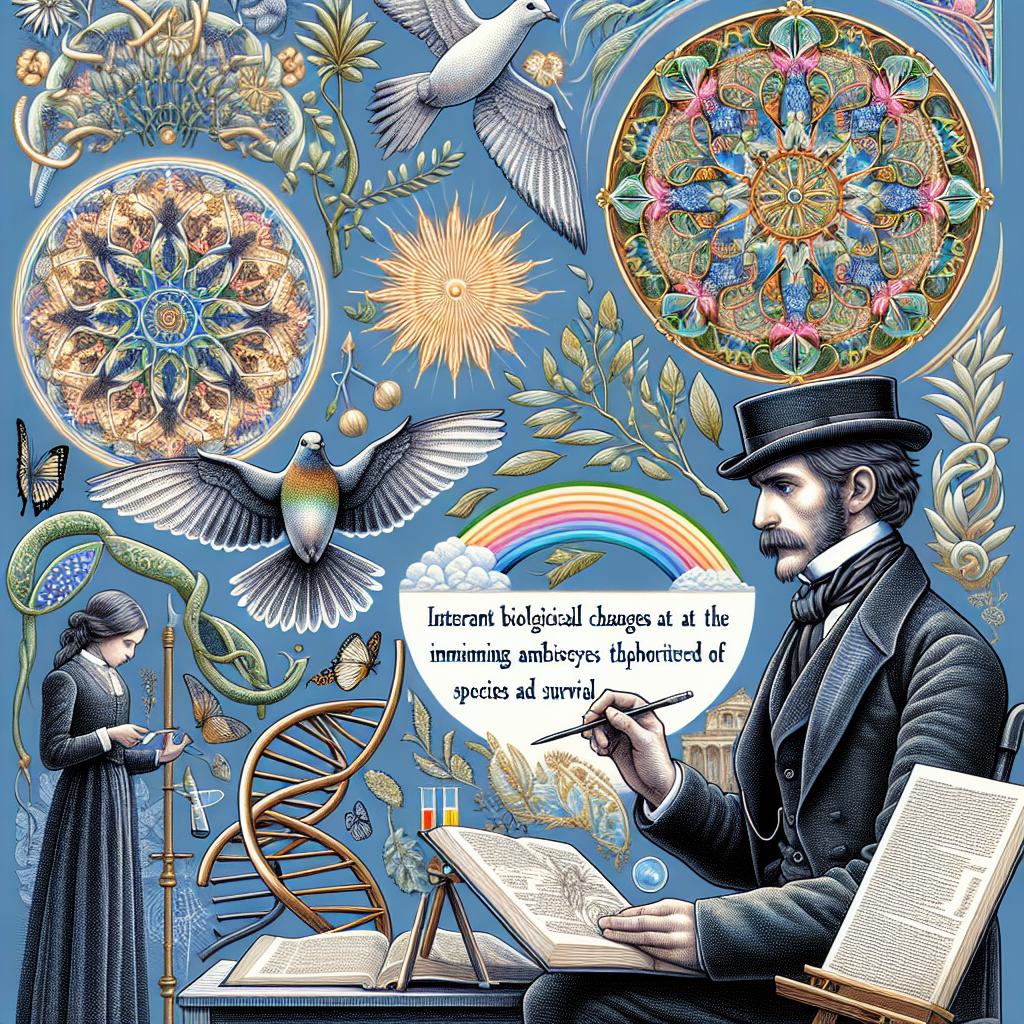
Unveiling God's Plan: Epigenetics and Darwinism in Christian Perspective
Published: 29 May 2024
Epigenetics and Darwin: A Fresh Perspective on Evolution
Introduction
It is often surprising to learn that Charles Darwin, the renowned scientist behind the theory of evolution, actually rejected his own ideas in favor of a Lamarckian view of inheritance. While Darwin is commonly associated with the concept of natural selection and genetic variation, his later work introduced the idea of pangenesis, a Lamarckian process where acquired characteristics can be passed on to future generations. This notion has recently gained traction in the field of epigenetics, which explores non-permanent modifications to the genome that can be inherited. In this article, we will explore how epigenetics challenges traditional Darwinian evolution and offers a new perspective on inheritance.
The Lamarckian View and Darwin's Shift
Darwin's landmark publication, "On the Origin of Species," presented natural selection as the primary driver of evolution. However, nearly a decade later, he proposed the concept of pangenesis in his work "Variations of Plants and Animals Under Domestication." This idea suggested that acquired traits could be inherited through the transfer of small particles called corpuscles from various body parts to the germ cells. This Lamarckian perspective deviated from his earlier emphasis on natural selection alone.
In "The Descent of Man," Darwin further expanded upon this shift in thinking by acknowledging a combination of natural selection, sexual selection, and pangenesis as the driving forces behind evolution. He cited examples such as sailors becoming farsighted and watchmakers becoming nearsighted due to their respective occupations, suggesting that acquired traits can indeed be passed on to offspring. However, it is important to note that Darwin's ideas on pangenesis have since been disproven.
The Emergence of Epigenetics
For many years, geneticists adhered to the belief that an individual's environment could not influence the phenotype (observable characteristics) of their offspring. However, a relatively new field called epigenetics challenges this notion. Epigenetics explores the non-permanent modifications to the genome that can be inherited and affect gene expression. The main mechanism behind these modifications is DNA methylation, where a methyl group is attached to specific cytosine residues within the DNA. Methylation can silence genes by blocking the transcription machinery responsible for gene expression.
Importantly, evidence suggests that these methylation patterns can be transmitted from one generation to the next. This means that an organism's behavior and physical characteristics can be influenced by its environment, and these changes can be inherited by offspring. However, the reversibility of epigenetic modifications is also key to understanding their impact on inheritance. When the environmental trigger is removed, the methylation patterns can revert back to their original state.
Epigenetics Challenging Traditional Darwinian Evolution
Epigenetics poses a challenge to traditional Darwinian evolution because non-permanent changes create a moving target for natural selection. According to Darwinian evolution, natural selection acts on genetic variations within a population. However, if phenotypic changes caused by epigenetic modifications are inheritable, individuals may be falsely targeted for selection based on traits that do not reflect their underlying genetic makeup. When the epigenetic modification is reset in subsequent generations, any selection against these individuals becomes ineffective.
To illustrate this point, consider a scenario where a certain diet in mice leads to epigenetic changes that result in a coat color providing excellent camouflage. Mice without this coat color may be at a disadvantage and potentially selected against. However, there is no genetic difference determining coat color; it is solely influenced by their diet. Consequently, the elimination of individuals without this coat color due to natural selection becomes futile once the effect wears off and the coat color returns to its original state.
Additionally, the significant impact of epigenetic changes challenges natural selection's ability to recognize and act upon genetic variations. Most mutations have little to no effect on an individual's fitness and are often invisible to natural selection. In contrast, epigenetic changes can have a substantial impact on gene expression. This noise generated by epigenetics further complicates the ability of natural selection to remove mutations effectively, raising questions about how evolution can proceed under these circumstances.
The Complexity of Evolutionary Forces
Similar to Darwin's recognition that a combination of forces shapes evolution, modern evolutionary theory acknowledges the interplay of various factors. Alongside natural selection, neutral drift and epigenetic modifications are now recognized as significant contributors to genetic variation. While epigenetics does not explain all forms of variation, it highlights the potential for reversible environmental influences on genetic expression.
Epigenetics has partially vindicated Darwin's departure from strict "Darwinian" evolution, which solely emphasized natural selection. However, the unresolved question remains whether natural selection can effectively navigate the complexities introduced by epigenetic modifications. Epigenetics offers exciting opportunities to explore the intricacies of inheritance and gene expression, raising important questions about the mechanisms underlying evolution.
Why This Matters
Understanding the role of epigenetics in inheritance challenges traditional views of evolution and raises fundamental questions about how genetic variation is shaped. It prompts us to reconsider the mechanisms that contribute to species diversity and highlights the importance of exploring non-genetic factors in evolutionary processes. Epigenetics offers a fresh perspective on inheritance that complements our understanding of genetics and provides new avenues for research in evolutionary biology.
Think About It
- How does the concept of Lamarckian inheritance, as reintroduced through epigenetics, challenge traditional Darwinian evolution?
- What implications does epigenetics have for how we understand the role of natural selection in shaping genetic variation?
- Reflecting on Darwin's shift from strict "Darwinian" evolution to incorporating Lamarckian ideas, how does this historical perspective shape our understanding of the complexities of evolutionary forces?
- Consider the potential impact of epigenetics on our understanding of inheritance and evolution. How might this knowledge shape future research in the field?
